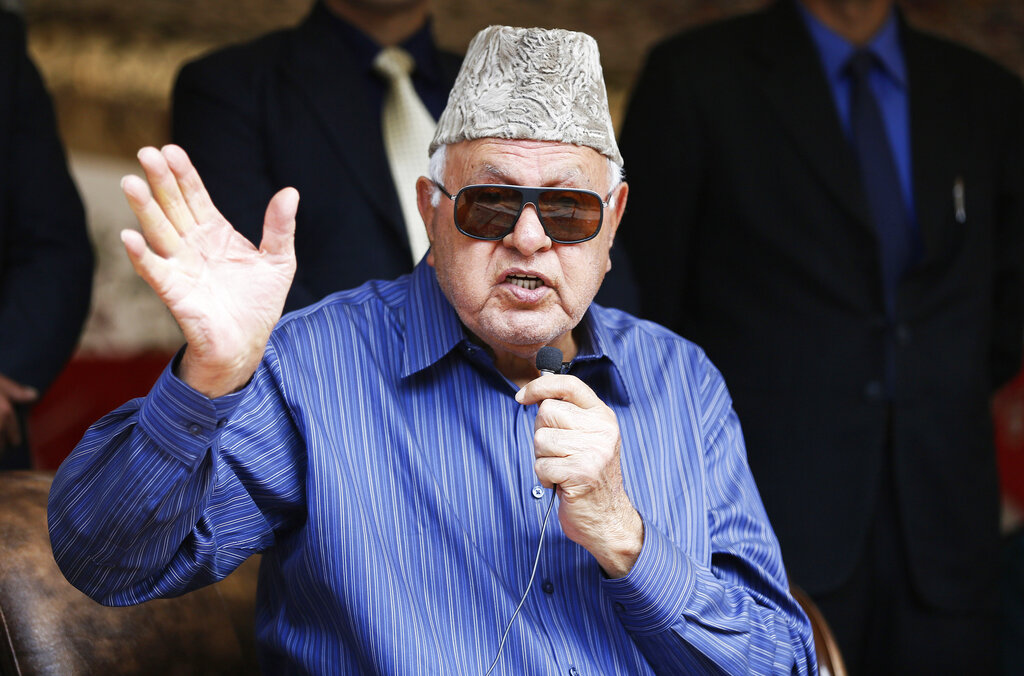Kashmir’s pro-independence camp has found a vigorous advocate in Suraiya Abdullah, youngest daughter of National Conference founder Sheikh Mohammad Abdullah, courtesy the scrapping of Jammu and Kashmir’s special status on August 5.
“I am for independence (of Jammu and Kashmir) but I can’t speak for others (in the family)…. Nobody has been kind to us, neither one country nor the other (India or Pakistan),” the former professor of literature told The Telegraph in the first media interview by any member of the Abdullah family since August 5.
“I’m losing my faith in Indian democracy…. If it is not shaken now, when will it be?” she asked.
Suraiya, who is in her late 70s, felt India had ceased to be a democracy. She said she had no issues with the statement by Karti Chidambaram, son of former finance minister P. Chidambaram, equating the present government with the Nazis.
Karti had made the remark after the octogenarian Farooq Abdullah, former chief minister and Suraiya’s brother, was booked under the Public Safety Act, which allows detention without trial for up to two years.
“(Besides), if they (the Centre) get an opportunity, they will harass Muslims. They are always crying, ‘Hindutva, Hindutva’,” Suraiya said.
She cited several incidents of the lynching or harassment of Muslims in the country, including the lynching of Tabrez Ansari in Jharkhand and Assam police’s alleged stripping and torture of three Muslim sisters whose brother had purportedly eloped with a Hindu woman.
“They (the sisters) were disrobed by the police. Is it how things are done? There was a time there used to be democracy in the country,” Suraiya said.
She said she was no longer shocked at developments relating to Kashmir — particularly the PSA detention of her brother — since the revocation of the state’s special status and the clampdown that followed.
“There is no law and order (in Kashmir). They have arrested (former chief ministers) Omar (Abdullah) and Mehbooba (Mufti) Ji under some order. There was no (formal) order to put him (Farooq) under house arrest. The home minister (Amit Shah) said in Parliament that he (Farooq) was free and enjoying (himself). How free was he?” she said.
Suraiya accused the Centre of back-stabbing, saying it had done it to a man who had always stood by the Indian establishment.
“Our people (Kashmiris) were unhappy with what he (Farooq) was doing. In Delhi, there was a function where he said something ‘Bharat’ (Bharat Mata ki jai). Did you see people’s reaction (at Hazratbal) where he was insulted (afterwards)? Thankfully, he was not shoved,” she said.
Suraiya said the present situation had parallels with the arrest of her father Sheikh Abdullah, then the prime minister of Jammu and Kashmir, in Gulmarg in 1953. She said the family had been sleeping in adjacent cottages when the police knock came.
“My brother Mustafa, who was 15 then, and I were in one cottage. I was 12 or 13. They knocked on the door and Mustafa opened it. There was a DIG (deputy inspector-general) Thakur who said, ‘Sheikh sahib has been arrested’,” she recalled.
“They asked Sheikh sahib to accompany them but he wanted to hear the All India Radio news in the morning. The first news was that Sheikh sahib had been deposed and (his deputy) Bakshi Ghulam Mohammad had taken over. When he heard it, he accompanied them.”
Sheikh Abdullah was accused of travelling to Gulmarg to meet people from across the border. “It was just an allegation,” Suraiya said.
Gulmarg has been in the spotlight this time too. The army’s Valley chief, Lt Gen. K.J.S. Dhillon, recently said the forces had conducted 350 operations in the area after receiving reports of infiltration by militants, and that he had himself visited the area around half-a-dozen times.
Suraiya said the only difference between the two episodes was that no Bakshi had arisen this time so far. “Bakshi was his (Sheikh Abdullah’s) right-hand man. It’s not clear who the new Bakshi could be.”
She said she felt the pro-India constituency would shrink in the Valley after last month’s decisions and crackdown.
“If you are in trouble, you look to the policeman for help. But if the same policeman throws stones at you what will you do, what respect will he command?” she said, drawing an analogy with New Delhi.
Suraiya said her appeal to India’s intelligentsia would be what Farooq had said on August 4, when it seemed the Centre was poised to make a big-ticket announcement.
“My brother said that day, ‘I have stood by them through thick and thin; I expect they would stand with us through thick and thin’. He was appealing to the Indian intelligentsia,” she said.











